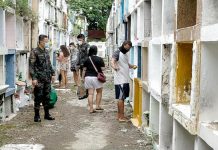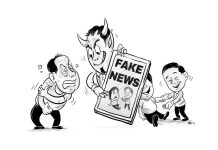
THE PHILIPPINES is a nation full of kind, generous, resilient and long-suffering people who, for centuries, have been misled by and burdened with the corruption and injustice committed by dynastic families. The Spanish colonizers brought with them a version of “Christianity” that fell far short of what Jesus of Nazareth wanted his followers to believe in.
Jesus wanted all people to lead lives full of virtue, integrity, honesty, justice, goodness and love of neighbor, and to stand against the oppressors of the poor. He said the Kingdom of God was for the poor and the downtrodden, and promised freedom from injustice. But the version of Christianity the Spaniards brought was not only different, but also used to control the natives. It promoted subservience and was twisted to commit corruption, abuse and injustice. The Church and State then were almost one and the same.
The focus of Christian action today is more on sacramental action at the altar and too little social action in villages and on the streets. Jesus wanted action for the poor to free them from manmade oppression and poverty. Has the historical version of Spanish Catholicism brought about a just and more equal nation?
There are 131 Catholic bishops — some of whom are already retired — and approximately 11,000 priests serving the country’s more than 80 million Catholics. Have they transformed the nation into one where justice and love of neighbor rule, and inspired Filipinos and their elected leaders to do good and oppose the bad with the conviction that Christian love, justice and kindness would win over evil?
Such faith, Jesus said, will move mountains of injustice and see goodness triumph. Is that the kind of faith present in Philippine Catholicism or does conformity to Church dogma, rituals, processions and misdirected piety dominate?
Data from the Philippine Statistics Authority show that the Philippines, a naturally rich country, has a poverty rate of 15.5 percent as of 2023. This means 17.54 million Filipinos are hungry, unable to support themselves or their children, and cannot live a healthy life.
The 2025 Chandler Good Government Index, which ranks nations on good governance, integrity and equality, shows that the Philippines placed 57th out of 120 countries. And in the 2024 Corruption Perceptions Index, the Philippines got a low 33 score and was ranked 114th out of 180 countries because of widespread corruption and injustice.
Weak performance
Why is the country performing weakly in these indices? Is this because the wealthy elite have captured the institutional Church, and the majority in its hierarchy bend to serve the rich more than the poor?
By contrast, Singapore has no natural resources and only has a population of 5.918 million, of whom 395,000 are Catholics, led by a single bishop. Some 21 percent of Singaporeans have no religion. The 2023 Transparency International Corruption Perceptions Index ranked Singapore the fifth least corrupt country out of 180 countries, with a score of 83.
The city-state has a strict code of behavior and rule of law. Singaporeans are among the most prosperous people in Asia, and have almost zero corruption and crime. Are the Singaporeans more Christian than Filipinos?
Catholicism appears to have little or no positive moral influence to transform society with the basic values and virtues that would bring it to respect and promote the rights of Filipinos to food, employment, education, health, security, housing and a high-quality life. Although hundreds of thousands of Filipinos attend Sunday Mass and participate in the sacraments, the Catholicism they espouse has not inspired them to overcome the social and political evils and change society for the better or for themselves. (To be continued)/PN







